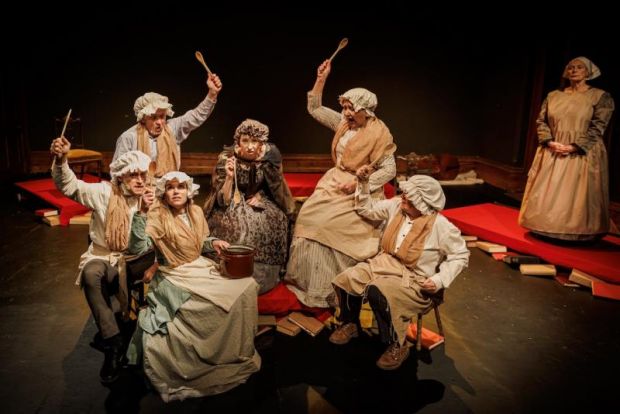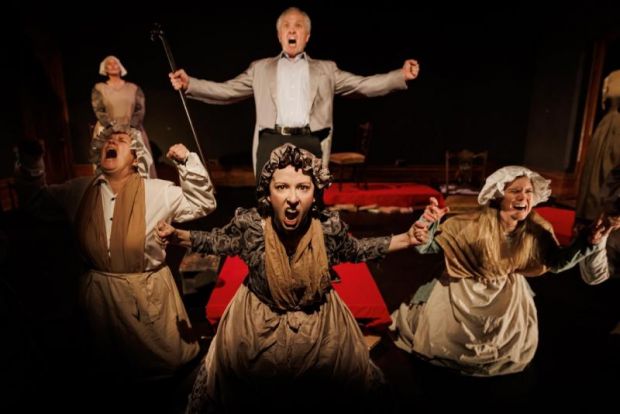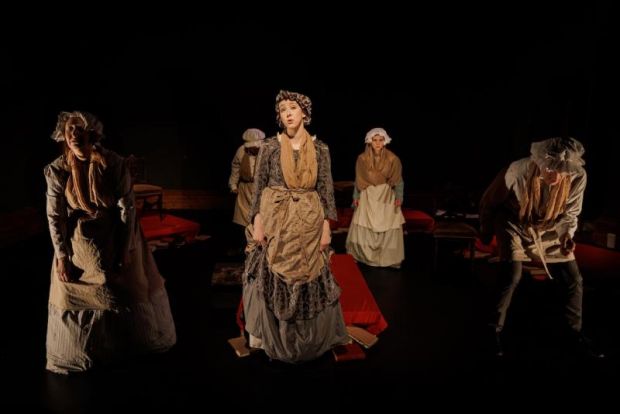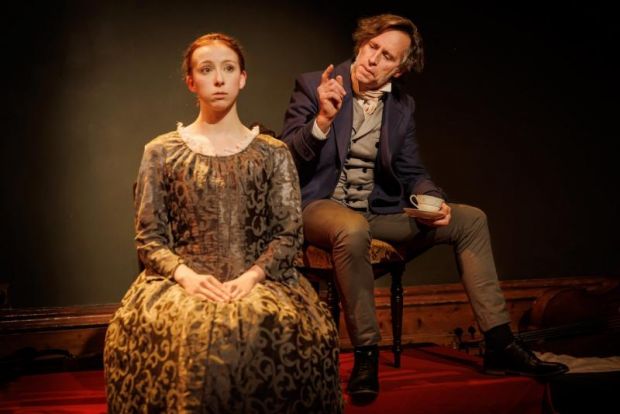Jane Eyre
Here is a sensitive – and skilful – adaptation of this famous and much-loved 1847 novel. Christine Davey has selected events, but more importantly, the emotions of this story of Jane Eyre – and turned them into theatre. The novel is a first-person account of Jane’s life - from harassed and bullied orphan to romantic heroine and finally mother of her own children – and so in this adaptation, our heroine Jane (Tess Parker) herself is our narrator.
But there are also tight and economic dramatic scenes that give us the essence of Jane’s life and development. Davey is also the set designer, collaborating with Katie Williams’ as lighting designer. Rather than slowing things down with fussy detail, the lighting signals change of place or emphasis. The set is simply four low red covered platforms, ringed with books, and some benches and stools. This minimalism makes plain Davey’s excellent stagecraft. There is her use of movement - choreography if you like – with her small cast (only seven besides Tess Parker) creating a multitude of characters and milieux. There many characters and there are big houses and small houses, icy dormitories, classrooms and drawing rooms, stairs to the famous attic at Thornfield Hall, carriage rides, lonely roads, icy storms, and pretty gardens – all conjured up in our imaginations.

There are, certainly, some curious anomalies such as the female cast all in Emma Watson’s 19th century garb, but Brocklehurst and St John (both Simon Carroll) are in contemporary outfits including open necked shirts. Rochester (Glen Barton) comes closer, but the modern shoes are off-putting. Glen Barton also plays the cello, but is that in character or as incidental music?
Jane’s narration carries the story forward (but why does she call us ‘Reader’ when we’re not reading?). There are many fierce and emotional confrontations as Jane is driven to assert herself as a feeling human being in a hostile world. There are episodes too of calm and happiness when Jane makes brief connection with a friend, an ally, or the children she teaches. As Jane, Tess Parker is well cast visually and in demeanour. But while Jane’s emotions are abundantly clear, there is perhaps a diction problem: when Janes is distressed or angry, Parker tends to shout, to swallow words and text is lost.

Otherwise, Katie Hall is suitably mean and harsh as Aunt Reed and motherly as Mrs Fairfax. Melissa Musselwhite is Bessie and Hannah; and Sarah Smits is nasty cousin Helen and airhead heiress Blanche. Madelaine Swain (recently excellent in another Skin of Our Teeth production My Brilliant Career) gets away with two pants roles as wedding spoiler Mason and as bully cousin John. Graci Rogers is impressive, clearly distinguishing the very different roles of Miss Temple, the kindly teacher at the Lowood school, Adele, Rochester’s flighty ward, and the insane destructive Bertha, locked in the attic.
The men unfortunately fare less well. Simon Carroll scores three roles, one of which is Rochester’s dog Pilot. He does the last well, but Pilot seems to be a distracting error of Judgement – a stylistic choice way out of keeping with the rest - on writer/director Davey’s part. Glen Barton’s Rochester is, for me, just too nice, and not enough of the dark, brooding, enigmatic Romantic hero - but perhaps I am stuck with Orson Welles in the 1943 movie.

Naturally, there is no good adaptation without a guiding principle and here it is on the clearly feminist import of the tale – but without lurching into preachy or agit-prop. Jane’s outbursts come when her feelings overflow after keeping herself rigidly under control or when injustice against her is blatant. She is of her time and the adaptation does not violate that; she never asks for the right to vote, an education, or to own property; she simply demands – and demands is the word - to be treated justly and with respect.
There is no doubt that central element of this 19th century story works for a contemporary audience. The murmurs from the young women in the audience (some studying the book for the VCE) and comments afterwards – even quoting Jane’s dialogue - confirmed that they were with Jane all the way in her struggle to be recognised, seen, and acknowledged. Christine Davey’s achievement in both her adaptation and her direction is to make this classic novel live now.

Skin of Our Teeth is a regional company with, I’d guess, limited resources. This doesn’t stop them – and Christine Davey in particular – from making inventive, innovative, bold theatre. Their My Brilliant Career in 2021 was another fine example of imaginative adaptation. More please.
Michael Brindley
Photographer: Darren Gill
Subscribe to our E-Newsletter, buy our latest print edition or find a Performing Arts book at Book Nook.

